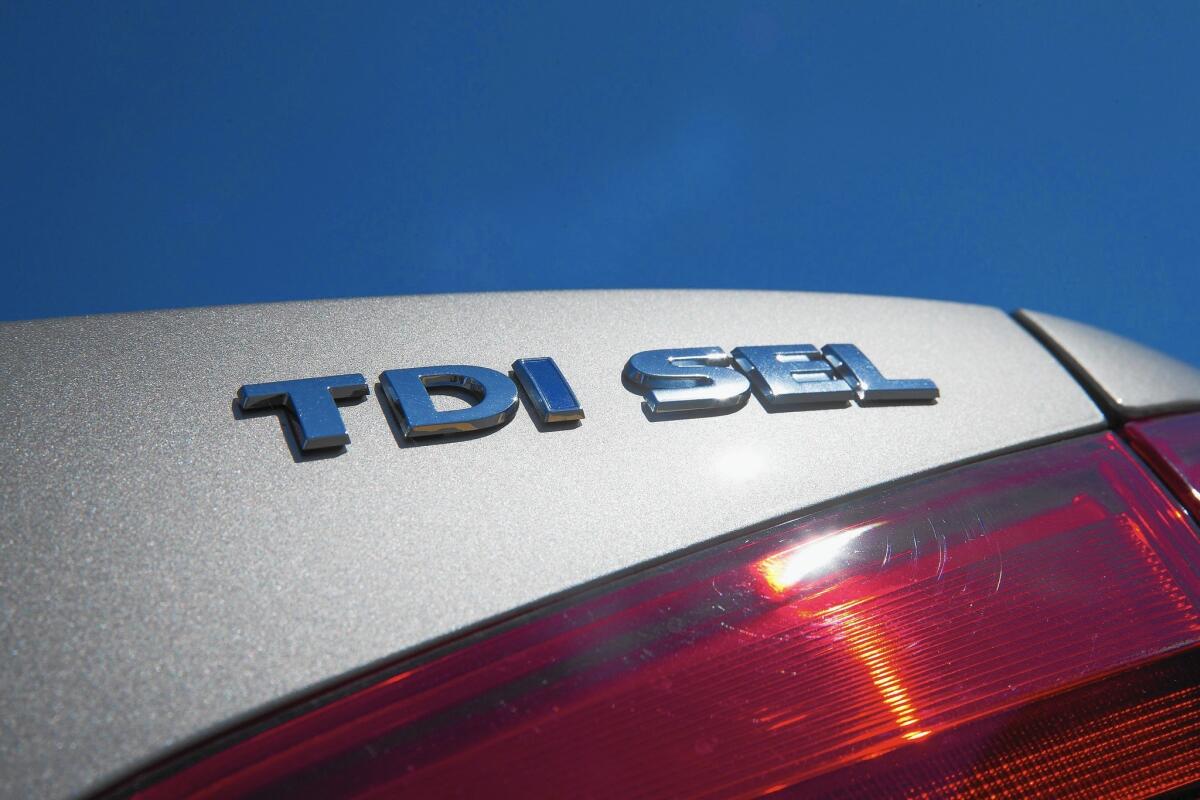Diesel fans fear Volkswagen emissions scandal may tarnish technology

A 2015 Volkswagen Passat, one of the models marketed by VW as using a “clean” diesel powertrain, is for sale at a dealership in Evanston, Ill.
- Share via
The Volkswagen emissions cheating scandal has tanked the company’s stock price, ousted its top executive and could ultimately cost the world’s top automaker tens of billions of dollars.
It may also destroy the credibility of diesel technology from all automakers.
Diesel engines are at the heart of Volkswagen’s subterfuge. The company has admitted installing a “defeat device” in about 11 million vehicles that allow them to emit far fewer pollutants during tests than during real-world driving. The entire technology may be tarnished by Volkswagen’s sins, analysts said.
“It’s bad for diesel in the U.S.,” said Mark Wakefield, managing director and head of automotive practices for the consulting group AlixPartners. “There isn’t a high bar on creating a concern in the consumer’s mind. Now people are waiting to see if this is really a one-company issue.”
Diesel fans admire the vehicles’ good fuel economy, performance and range. Some diesel cars routinely drive 500 to 600 miles between fill-ups. The cheating software was built into diesel versions of model year 2009-15 VW Jettas, Beetles, Golfs and Audi A3s, along with 2012-15 model Passats.
Independent researchers found that the cars, marketed by Volkswagen as using “clean” diesel powertrains, emitted up to 40 times more nitrogen oxide while on the road than in test conditions. Volkswagen has promised to remove the “defeat device” and bring the questionable cars into compliance.
Owners of the affected vehicles, angered by the news, have expressed concern that required modifications to their cars will lower the performance, fuel efficiency or both.
Only about 3% of all autos and light truck sales involve diesel power trains. But fallout from the VW debacle could have a visible effect on California roads. Almost 15% of the affected 482,000 Volkswagens and Audis were registered in the state, which is the No. 1 market for diesel vehicles in the U.S.
That percentage could drop, said Allen Schaeffer, executive director of the industry group Diesel Technology Forum.
“But diesel is a proven technology,” he said. “Nothing has changed in the laws of physics. This is still the most energy-efficient internal combustion engine.”
Echoing that, the California Air Resources Board urged consumers not to blame diesel for Volkswagen’s actions.
“These diesel engines can perform cleanly,” the agency’s David Clegern said. “There are diesel engines that meet the current diesel emission standards.”
The Environmental Protection Agency has said it will now retest all diesel vehicles in the U.S., including those using six-cylinder engines, and will not limit the testing to cars made by the Volkswagen Group.
That will mean a lot of testing. According to the Diesel Technology Forum, there are 39 diesel-powered passenger vehicles being sold in the U.S., made by Audi, BMW, Chevrolet, Jaguar, Jeep, Land Rover, Mercedez-Benz, Porsche, Ram and Volkswagen.
That number will grow, the forum said, by 15 more vehicles within the next year. Among the new entries will be light trucks from GMC, Chevrolet and Nissan.
Not among them will be Mazda. The company has been expected for several years to begin offering a diesel option in the U.S. This week the company said the North American sale of that vehicle has been delayed “to ensure customers were able to get the performance befitting a Mazda.”
Current headlines are not the first difficulties to affect diesel sales. The last few years have posed less-than-ideal conditions.
“This is a technology that’s used to head winds,” Schaeffer said, citing the recent economic recession and record high prices for diesel fuel in the U.S.
At the same time, automakers were offering new alternative fuel vehicle options, including hybrids, plug-in hybrids, battery electric and even hydrogen fuel cell vehicles.
But in 44 of the 48 months from 2008 to 2012, sales of diesel vehicles grew steadily, Schaeffer said.
Anger at Volkswagen percolated to a boil on social media after the company admitted that it had cheated. Volkswagen’s diesel deception has damaged brand loyalty — particularly in those who doted on their vee-dubs.
“I loved mine!” said Amy Grey, a film and TV publicist who had been driving Sportwagen TDIs for the last six years and was thinking of buying another one. “But my feelings have changed. I feel betrayed by the brand. I’m not going to support a company that is deceptive.”
Some of those owners now believe that they’re stuck with polluting cars they dislike — cars they bought specifically to avoid polluting.
Conchita Lozano-Batista, a San Francisco labor lawyer and mother of two, said she and her husband liked their Golf diesel so much that they bought a 2009 Sportwagen as soon as it hit the market. She liked it so much that she declined her employer’s offer to buy her a company car, preferring to drive her own “clean” diesel.
Lozano-Batista now takes quite a different view.
“It’s like an albatross around my neck, and frankly I hate driving the damn thing,” she said. “We put our kids in it yesterday. It was a bitter moment. ‘Let’s go pollute in our falsely advertised vehicle.’ I’ll never buy a VW again.”







